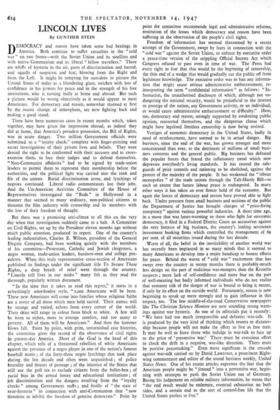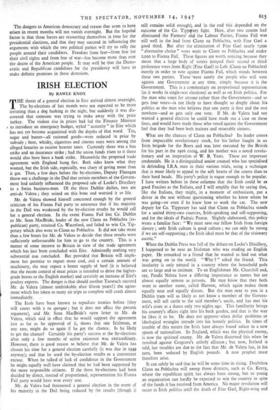LINCOLN LIVES
By GUNTHER STEIN
DEMOCRACY and reason have taken some bad beatings in America. Both continue to suffer casualties in the " cold war " on two fronts—with the Soviet Union and its satellites and with native Communism and its liberal " fellow travellers." There are whiffs of hysteria in the air, gusts of discrimination and hatred, and squalls of suspicion and fear, blowing from the Right and from the Left. It might be tempting for outsiders to picture the United States of today as a blundering giant, stricken with loss of confidence in his powers for peace and in the strength of his free institutions, who is turning bully at home and abroad. But such a picture would be wrong objectively as it would appear to most Americans. For democracy and reason, somewhat stunned at first by the recent change of atmosphere, are now fighting back and making a good stand.
There have been numerous cases in recent months which, taken together, may have given the impression abroad, as indeed they did at home, that America's proudest possession, the Bill of Rights, was in acute danger. Two million Government officials were submitted to a " loyalty check," complete with finger-printing and secret investigations of their private lives and beliefs. They were denied the right to be confronted with their accusers and to cross- examine them, to face their judges and to defend themselves. "Non-Communist affidavits " had to be signed by trade-union leaders to permit them to represent their membership before the authorities, and the political fight was carried into the rank and file of the unions. Racial discrimination arose, and lynchings of negroes continued. Liberal radio commentators lost their jobs. And the Un-American Activities Committee of the House of Representatives investigated the "Reds " in Hollywood in a manner that seemed to many ordinary, non-political citizens to threaten the film industry with censorship and its members with the loss of their freedom of thought.
But there was a promising anti-climax to all this on the very day when that investigation suddenly came to a halt. A Committee on Civil Rights, set up by the President eleven months ago without much public attention, produced its report. One of the country's leading industrialists, Charles E. Wilson, president of the General Electric Company, had been working quietly with the members of his committee—Protestant, Catholic and Jewish clergymen, a negro woman, trade-union leaders, business-men and college pre- sidents. When this truly representative cross-section of Americans published its findings under the significant title To Secure These Rights, a deep breath of relief went through the country. "Lincoln still lives in our midst" many felt as they read the thorough, popularly written document.
" In the time that it takes to read this report," it starts in a refreshingly unorthodox style, " lt,000 Amerkans will be born. These new Americans will come into families whose religious faiths are a roster of all those which men hold sacred. Their names will be strange and varied, echoes from every corner of the world. Their skins will range in colour from black to white. A few will be born to riches, more to average comfort, and too many to poverty. All of them will be Americans." And then the hammer blows fall. Point by point, with grim, unvarnished case histories, the committee gives the record of the observance of civil rights in present-day America. Short of the Goal is the head of this chapter, which tells of a threatened rebellion of white Americans against the presence of a negro player in one of the nation's famous baseball teams ; of the forty-three negro lynchings that took place during the last decade and often went unpunished ; of police brutality and threats of peonage ; of the injustice of the States that still use the poll tax to exclude citizens from the ballot-box ; of racial bias in the armed forces and educational institutions ; of job discrimination and the dangers resulting from the "loyalty checks " among Government staffs ; and finally of " the state of near-hysteria " in connection with anti-Communism that " now threatens to inhibit -the freedom of genuine democrats." Point by
point the committee recommends legal and administrative reforms, restitution of the losses which democracy and reason have been suffering in the observation of the people's civil rights.
Freedom of information has seemed threatened by a recent attempt of the Government, swept by fears in connection with the " cold war " against the Soviet Union, to enforce by executive order a peace-time version of the crippling Official Secrets Act which Congress refused to pass even in time of war. The Press had every right to fear that this would be the beginning of censorship, the thin end of a wedge that would gradually cut the public off from legitimate knowledge. The executive order was to ban any informa- tion that might cause serious administrative embarrassment, re- interpreting the term " confidential information" as follows: " In- formation, the unauthorised disclosure of which, although not en- dangering the national security, would be prejudicial to the interest or prestige of the nation, any Government activity, or an individual, or would cause administrative embarrassment or difficulty." Here, too, democracy and reason, strongly supported by awakening public opinion, reasserted themselves, and the dangerous clause which might have legalised -limitless censorship is now being revised.
Vestiges of economic democracy in the United States, badly in need of reinforcement, have seemed to be in actual danger. Big business, since the end of the war, has grown stronger and more concentrated than ever, to the detriment of millions of small busi- ness concerns and the general public. Big business has defeated the popular forces that feared the inflationary trend which now depresses everybody's living standards. It has caused the safe- guards of price controls and rationing to be abolished, against the protest of the majority of the people. It has weakened the "labour monopolies " of the trade unions through the Taft-Hartly Bill—to such an extent that future labour peace is endangered. In many other ways it has taken an ever firmer hold of the economy. But again the forces of democracy and reason have proved able to fight back. Under pressure from small business and sections of the public the Department of Justice has brought charges of " price-fixing conspiracy " against various powerful industries. A short time ago, in a move that was heart-warming to those who fight for economic democracy, it filed in a Federal District Court an accusation against the very fortress of big • business, the country's leading seventeen investment banking firms which controlled the management of 69 per cent. of all'securities issued during the last decade.
Worst of all, the belief in the inevitability of another world war has recently been implanted in so many minds that it seemed to many Americans to develop into a major handicap to honest efforts for peace. Behind the waves of "cold war" excitement that has swept over the country in recent months there is probably *much less design on the part of malicious war-mongers than the Kremlin suspects ; more lack of self-confidence and more fear on the part of well-meaning but badly informed individuals who do not realise that constant talk of the danger of war is bound to bring it nearer, if only by its effect on the outside world. Fortunately, reason is now beginning to speak up more strongly and to gain influence in this respect, too. • The few middle-of-the-road Conservative newspapers like The Christian Science Monitor are now sounding strong warn- ings against war hysteria. As one of its editorials put it recently: " We have had too much irresponsible and defeatist war-talk. It is produced by the very kind of thinking which resorts to dictator- ship because people will not make the effort to live as free men. It may be well to force those who indulge in war-talk to face up to the price of preventive war.' There must be conscious effort to check the drift in a negative, war-like direction. There must be positive peacemaking." Even more significant is the crusade against war-talk carried on by David Lawrence, a prominent Right- wing commentator and editor of the sound business weekly, United States News. One of his recent articles expresses the fear that the American people might be " jittered " into a preventive war, begin- ning with attempts to push the Soviet Union out of Germany. Basing his judgement on reliable military information, he warns that "the et d result would be stalemate, eventual exhaustion on both sides, and a certain end to the sort of control-free life that the United States prefers to live."
The dangers to American democracy and reason that seem to have arisen in recent months will not vanish overnight. But the hopeful factor is that those forces are reasserting themselves in time for the presidential elections, and that they may succeed in influencing the arguments with which the two political parties will try to rally the people around their candidates. Freedom from fear—from fear for their civil rights and from fear of war—has become more than ever the desire of the American people. It may well be that the Demo- cratic and Republican candidates for the presidency will have to make definite promises in these directions.































 Previous page
Previous page